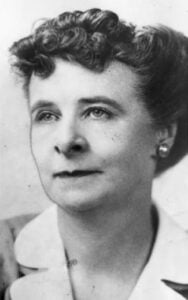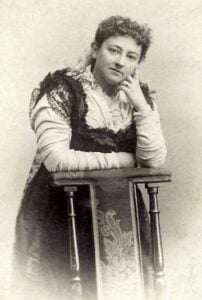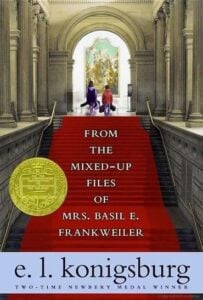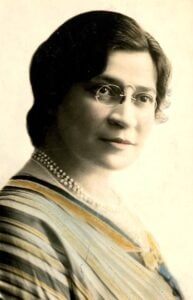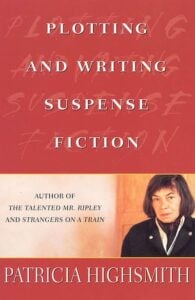By Nava Atlas | On February 13, 2026 | Comments (0)
Ida Tarbell, Genevieve Forbes Herrick, and Anne O’Hare McCormick, three trailblazing journalists from the early twentieth century, fought to report hard news — the kinds of stories that have a place on the front page.
At right: Genevieve Forbes Herrick, who is very rarely depected in a photo.
The American newsroom of the first decades of the twentieth century, where front-page news was produced, was all but closed to women. Ishbell Ross, a respected journalist of the 1920s, believed that all city editors secretly thought: “Girls, we like you well enough, but we don’t altogether trust you.” Read More→
By Taylor Jasmine | On February 11, 2026 | Comments (0)
Rereading favorite books from childhood as an adult is the literary equivalent of a warm bowl of comfort food or a soft blanket. Their nostalgic pull is undeniable, likely because the stories we want to return to usually invoke a feeling of safety and predictability — the opposite of what life often feels like to us as adults.
Here are seven such revisits, some focusing on single books, others on entire series. Let’s dive in with several by Literary Ladies Guide contributor Marcie McCauley, who is our resident expert on revisiting beloved children’s literature with an adult perspective. These are followed by two others, one by Nancy Snyder and another by Jill Fuller.
Here’s what’s ahead: Read More→
By Alex J. Coyne | On February 7, 2026 | Comments (0)
Olive Schreiner (1855 – 1920) was a South African writer and activist best known for her debut novel, The Story of an African Farm, first published in 1883 under the pseudonym Ralph Iron. It was republished in 1891 under her real name.
Today, Schreiner’s work is still widely studied, and she’s considered a pioneering anti-colonial feminist voice. She also wrote many articles, essays, and letters.
The following is a guide to Olive Schreiner’s books is for readers who would like a broader scope of her writing. Read More→
By Marcie McCauley | On February 4, 2026 | Updated February 7, 2026 | Comments (0)
E.L. Konigsburg summed up her stories as being about the “everyday, corn-flakes, worn-out-sneakers way of life” when she won the Newbery Award for her children’s novel From the Mixed-Up Files of Mrs. Basil E. Frankweiler in 1968.
This prize-winning novel was a favorite of mine from the first reading—the first sentence, even — because it begins with Claudia’s failure.
She knows she’s never going to be able to run away in “the old-fashioned way”— in the “heat of anger with a knapsack on her back.” She reflects on her situation and makes a plan: she learns to rise to meet challenges in her own way. Read More→
By Tyler Scott | On January 30, 2026 | Comments (0)
The Pink House by Nelia Gardner White is a 1950 novel that has the feel of a timeless classic. Yet like the rest of Gardner’s large body of work, it fell out of print and remained obscure and hard to find.
That is, until recently, when Independent press Quite Literally Books reissued it in a handsome new edition in 2025.
It’s surprising that a writer of her caliber would be so thoroughly forgotten. Her books were well reviewed and sold well. She was even a pioneer in the realm of what we now call biofiction: Daughter of Time (1942) is a novelization of the tragically brief and brilliant life of short story master Katherine Mansfield. It was warmly reviewed in the New York Times. Read More→
By Melanie P. Kumar | On January 27, 2026 | Updated January 29, 2026 | Comments (2)
In celebrating the success of Zohran Mamdani, the youthful maverick who took the office of New York City mayor in 2025, we might give credit where due to his mother, Mira Nair. She has been successful and influential in her own right as a filmmaker and director.
Zohran Mamdani’s meteoric political rise has created huge interest worldwide. Consideration of his origins might bring to mind the old adage, “the hand that rocks the cradle rules the world” — a reminder of the influence that mothers have on a society’s direction. Read More→
By Elodie Barnes | On January 22, 2026 | Comments (0)
Miriam Karpilove (1888 – 1956) was a Belarus-born immigrant writer of fiction in the Yiddish language, best known for Diary of a Lonely Girl (1918).
Photo at right: Miriam Karpilove, from the collection of David Karpilow.
Karpilove became well known for her serialized novels in the American Yiddish press, focusing on the lives of young Jewish women and exploring contemporary issues of gender roles, sexual mores, immigration, and cultural dislocation. Read More→
By Loretta Bushell | On January 17, 2026 | Comments (0)
Did you know that Patricia Highsmith, who rose to fame with novels like Strangers on a Train (1950) and The Talented Mr. Ripley (1955), also wrote about writing? Plotting and Writing Suspense Fiction is a delightful cross between an instructional guide and a personal diary sharing her own processes, struggles, and triumphs.
Highsmith is considered one of America’s greatest writers of psychological thrillers. Her books are must-reads for anyone aspiring to write crime or suspense fiction. (Incidentally, The Price of Salt (later republished as Carol and adapted into the 2015 film), is a seminal work in LGBTQ+ literature.) Read More→
